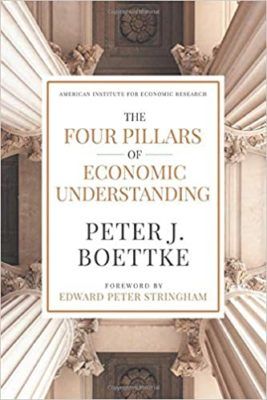Tyranny Can Be the Cost of Bad Public Policy
Imagine you sit down to enjoy a good home-cooked meal with your loved one. But as you both take the first bite, you find the food is just terrible. How did that happen? Nobody wants to make a terrible meal for their loved one on purpose. Something has gone awry, perhaps horribly so.
What could be the explanation? Perhaps bad ingredients are the culprit. Or perhaps it’s just a bad recipe. It could also be that the oven or stove isn’t working right. And, finally, it could just be that the ingredients were great, the oven worked perfectly well, the recipe is awesome, but you just are a bad cook and you executed the cooking of the meal badly.
There are important lessons to learn from this bad experience.
Try and Fail
I want to suggest this is similar to critical discussion of public policy. When policy solutions go awry, the culprit could be bad ideas or bad execution of good ideas. In either case, the public policies deviate from the preferences of citizens. This becomes particularly problematic when the costs of public policy are passed off to the future.
As public choice analysis has taught us, there is a certain logic to democratic deliberation over public policy, which tends to concentrate benefits on the well-organized and well-informed in the short run, and disperse the costs on the unorganized and ill-informed in the long run. This logic helps us explain why we have seen permanent deficit spending in the Western democracies, and policies that prioritize short-run relief from economic volatility over long-run economic growth. But if we don’t account for these long-run costs in our policy discussions, we are not engaged in an appropriate analysis.
Consider the work of my colleagues Chris Coyne and Abigail Hall, Tyranny Comes Home (Stanford 2018). It is a devastating look at the consequences of military adventurism abroad on domestic liberties. They dub this the “boomerang effect” and provide examples such as enhanced surveillance, militarization of police, and violations of human rights.
Coyne and Hall demonstrate that this boomerang is not a new phenomenon, but has deep roots in U.S. military history, though there is a cumulative erosive effect on the environment for liberty. How tragic is it that foreign interventions are justified as protections of domestic freedoms, but those freedoms are lost at the hands of those expected to have protected them?
Coyne and Hall conclude that (1) the costs of foreign interventions are grossly understated; (2) existing formal constraints on government abuse of power bend and eventually break in the face of the needs of war; and (3) ideology can usefully constrain, and that ideology must be an anti-war ideology. The answer then must be for social scientists to lay bear the true costs of the foreign intervention, not only in terms of monetary outlays but also in terms of lives and liberties lost.
Since “war is the health of the state,” as Randolph Bourne so eloquently put it, the formal constraints will always fade. Progressive Era intellectuals argued that constitutions need to be disregarded. These formal rules are only as binding as the underlying ideology that sustains them. Coyne and Hall argue forcefully for cultivating a consistent anti-war ideology, one grounded in the economic analysis of the true costs of militarization. This includes examining perverse incentives, the distortion of market signals and democratic feedback, and the loss of human freedom and dignity. If these full costs are taken into account, then the initial decision calculus might result in a more cautious approach to foreign military interventions.
Friedrich Hayek explains in detail why in the realm of public policy it is important to insist that principle be upheld in the face of expediency. Arguments for expediency understate the true cost of public policy because they neglect the beneficial outcomes of what would have occurred under a general principle of freedom. The proposed benefits of the expedient path are concrete, but the costs are unseen.
Hayek’s argument is in many ways a modern restatement of Bastiat’s insistence that good economics must look not only at the seen consequences of a policy, but also those which are unseen. As a consequence, the costs of public policy are typically understated because the counterfactual that would have occurred under a principle of freedom doesn’t occur under the false promises of expediency.
Perhaps the only way to win this game is to not play at all. If Coyne and Hall’s brilliant book can simply introduce the consideration of these costs to our domestic liberties into the policy discourse concerning foreign interventions, they will have elevated the conversation far beyond where it is now, and will have contributed greatly to saving not only financial resources wasted in military adventurism abroad, but lives and liberty, foreign and domestic.
Can you think of a more important use of basic economic reasoning? I cannot.













